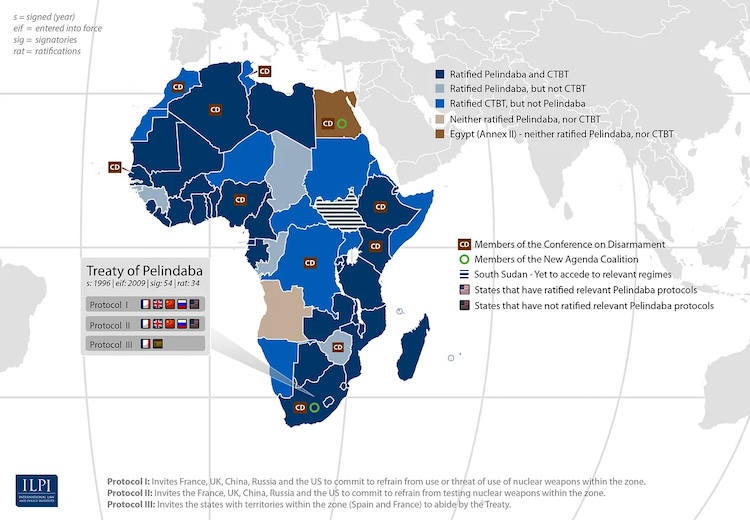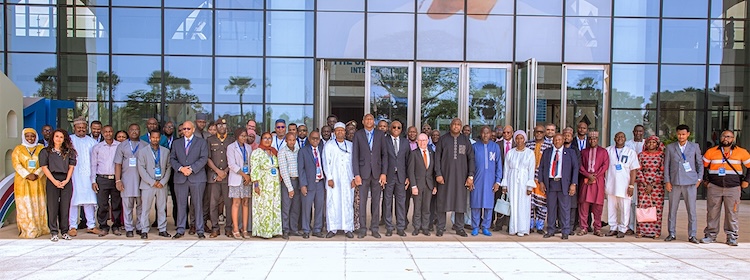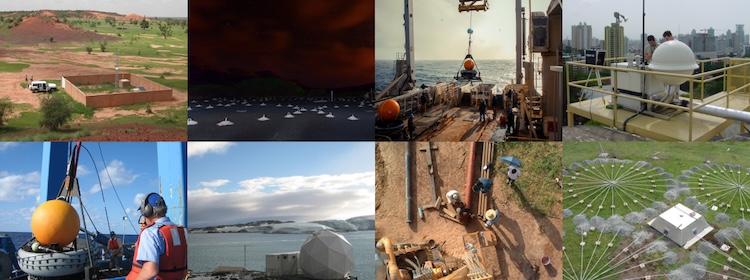By Ramesh Jaura
BERLIN | 3 July 2024 (IDN) — As one of the five Nuclear-Weapon Free Zones (NWFZs) covering Latin America and the Caribbean, South Pacific, Southeast Asia, and Central Asia, Africa has been a driving force in nuclear non-proliferation and disarmament—through the Treaty of Pelindaba—which entered into force on 15 July 2009
The continent has also played a crucial role in advocating for a global ban on nuclear testing—whether for military or peaceful purposes—and preventing the proliferation of nuclear weapons. To date, 52 African states out of 54 have signed the Comprehensive Nuclear-Test-Ban Treaty (CTBT), and 50 have ratified it.
Central Africa has achieved full adherence to the CTBT in 2022 through the ratifications of Equatorial Guinea and São Tomé and Príncipe, while The Gambia in the same year completed adherence in Western Africa. Southern Africa was already in full adherence. Furthermore, 24 African states host 38 of the IMS’s 337 facilities. South Africa also co-administers an auxiliary seismic station in Antarctica with Germany.

Worldwide, 187 nations signed the treaty on 10 September 1996, and 178 ratified it but has not entered into force, as eight specific nations have not ratified the treaty: China, India, Pakistan, North Korea, Israel, Iran, Egypt, and the United States.
The United States and China are two Nuclear Weapon States, which are signatories to the Treaty on the Non-Proliferation of Nuclear Weapons (NPT), but have refrained from ratifying the CTBT. Nevertheless, the Treaty has until now halted nuclear weapons testing worldwide. North Korea (also known as DPRK) is an exception. Since 2006, it has conducted six nuclear tests at increasing levels of expertise, prompting the imposition of sanctions.
But the looming threat of renewed U.S. nuclear testing has injected new uncertainty in relations between the United States and Russia, whose ties are “at their lowest level” since the 1962 Cuban missile crisis over the war in Ukraine and what Moscow casts as Washington’s attempts to stymie the emergence of a new multipolar world order.
Earlier, on 2 November 2023, President Vladimir Putin signed a law withdrawing Russia’s ratification of the CTBT on 30 June 2000.
CTBTO regional workshop in The Gambia

In the absence of the Treaty coming into force, the Preparatory Commission for the Comprehensive Nuclear-Test-Ban Treaty Organization (CTBTO)—set up in 1996 with its headquarters in Vienna, Austria, and tasked with building up the Treaty’s verification regime—has been promoting the CTBT’s universality.
The CTBTO held a regional workshop in Banjul, The Gambia, from 31 May to 1 June 2024. The event aimed to deepen understanding of the global nuclear testing ban treaty, with a focus on promoting full adherence across Africa, while also ensuring that all States Signatories benefit from Treaty membership.
CTBTO Executive Secretary Robert Floyd underscored the significance of the workshop: “We are here because a ban on nuclear testing is in the heart of this region. I see that every day through Africa’s leadership. And we want to make sure that all our partners benefit from our precious Treaty through collaboration, support, and capacity building.”
Twenty-seven persons from 23 countries attended the workshop. Opening the event, Attorney General and Minister of Justice of The Gambia, Dawda A. Jallow, restated support for the CTBT, saying: “We ratified the Treaty in 2022, demonstrating our commitment to nuclear non-proliferation and disarmament… Nearly all African nations have signed and ratified—also showing their dedication to a safer and more peaceful world.”
CTBTO reported that the two-day event featured a series of engaging sessions, with live interpretation to and from French, delving into various topics, including:
- Importance of the CTBT: Highlighting the Treaty‘s relevance to African security and the recent momentum towards universality, marked by nine global ratifications since 2022, including three from the region, as well as one signature.
- Legal and Technical Aspects: Discussions covered the Treaty’s legal framework, the various aspects of national implementation, and provided an overview of its verification regime.
- The International Monitoring System (IMS): A presentation on the technical capability of CTBTO’s state-of-the-art verification regime, which can detect nuclear test explosions by anyone, anywhere.
- Capacity Building Programmes, Training and Initiatives: Participants heard more about initiatives like NDCs4All, designed to give all States Signatories equitable access to IMS data and International Data Centre (IDC) products, which they can also use nationally for civil and scientific applications, such as earthquake warnings and climate change research.
Speaking about the programme, one of the participants, Mako Ronneliah Sitali, a senior geoscientist at Namibia’s CTBT National Data Centre (NDC), said: “I believe in teamwork. Being in a room with so much regional expertise was a fantastic opportunity to learn from each other and collaborate. This is a crucial first step towards realising our vision of a world without nuclear tests.”
A dedicated session for journalists offered insights into the Organization’s mission. Attendees included representatives from The Gambia’s Radio and Television Services, and five journalists from Côte d’Ivoire, Ethiopia, Ghana, Nigeria, and South Africa, who also covered the event for their respective outlets.
Marthe Kra Akissi Benedicte of Radio Côte d’Ivoire said: “I now feel better equipped to report on the CTBT and its verification regime with greater accuracy and context.”
Nebiyou Wondwossen, a reporter from Ethiopian Broadcasting Corporation also shared his perspective: “The knowledge gained here will enhance my ability to inform and engage the public on the pressing issue of nuclear testing.”
The CTBTO Regional Workshop for States Signatories of the African Region built upon previous efforts, including regional and sub-regional international training and workshops held in Cairo, Egypt; Nairobi, Kenya; Rabat, Morocco; Niamey, Niger; Abuja, Nigeria; Dakar, Senegal; Pretoria, South Africa and Tunis, Tunisia—among others.
Charles Oko, CTBTO Senior External Relations Officer, who oversaw the organization of the event, reflected: “This workshop was the first of its kind and follows the vision of Executive Secretary, Dr Robert Floyd, to increase outreach to our States Signatories and enhance their ability to contribute to and benefit from the Treaty. It targeted a region that is taking a leading role in universalising the CTBT. Through political backing and technical support, Africa has consistently contributed to our goal for peace and security. We hope participants are now better prepared to take full advantage of Treaty membership.”

International Monitoring System
According to the CTBT, 89 States are hosting IMS facilities. As of 2022, facility agreements with 41 Member States (jointly hosting around 50% of all IMS facilities) have entered into force, while 8 more (another 8% of IMS facilities) have already been signed. Forty Member States (representing 44% of all IMS facilities) have yet to sign a facility agreement.
The International Monitoring System (IMS) is a unique global network that, when complete, will consist of 321 monitoring stations and 16 laboratories hosted by 89 countries around the globe. Around 90 percent of these 337 facilities are already up and running, providing a steady flow of real-time data.
CTBO sources said, the system has already proved its effectiveness, detecting all six of North Korea’s declared nuclear tests between 2006 and 2017. In addition to this, it continuously picks up a wide range of phenomena including earthquakes, volcanic eruptions and meteor strikes, as well as non-nuclear explosions such as the blast that devastated Beirut in 2020.
IMS locations include some of the world’s most remote and inhospitable environments, posing engineering challenges unprecedented in the history of arms control. [IDN-InDepthNews]
Photo source: CTBTO


